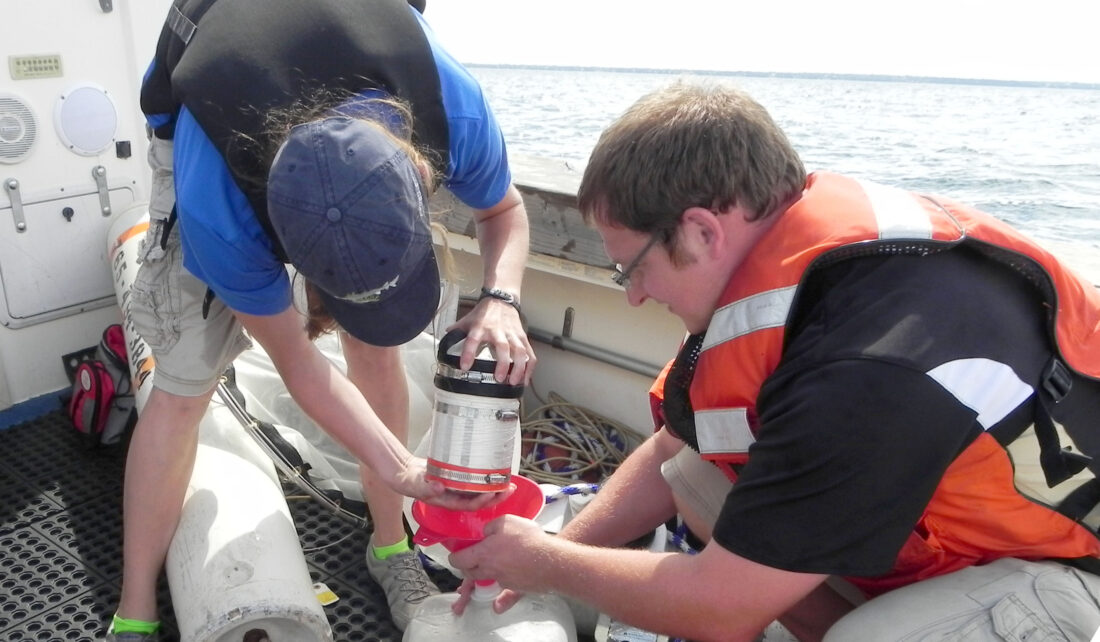
Illinois-Indiana Sea Grant (IISG) is announcing $890,000 of funding for five research projects in 2024−25. These projects will inform decision-making for some of the region’s pressing coastal issues, including the prevalence of contaminants, vulnerable shorelines, and water supply planning.
“We are enthused to support practical research projects of high import for the southern Lake Michigan region,” said Tomas Höök, IISG director.
For each of these two-year projects, the research team will share their data and results with broad audiences, whether through developing web tools, meeting with and informing key organizations or agencies, or engaging with the public.
Three projects are focused on assessing contaminant levels in Lake Michigan and its tributaries.
Jason Rohr, a biologist at the University of Notre Dame, will lead a project to use public datasets to better inform and estimate the environmental effects of contaminants in Lake Michigan tributaries. These water bodies are exposed to high levels of pollution from industry, agriculture, stormwater, and air pollution, which then flow into the lake. The researchers will integrate datasets into a web-based tool to assist decision-making associated with pollution-related hazards in the southern Lake Michigan region.
Several other projects will focus specifically on PFAS, or per-and polyfluoroalkyl substances, which are used in many products and industrial processes. PFAS are found in most waterways and they endure in the environment.
Also a Notre Dame biologist, Gary Lamberti and his team will quantify PFAS distribution in the lake’s tributaries in northwest Indiana, including in the environment and the food web, to assess the primary routes of PFAS exposure to sportfish and possible connections to local anglers. Daniele De Almeida Miranda, a research professor, will lead this work as the team documents the main routes by which PFAS is transported into streams connected to Lake Michigan.
Measuring PFAS from a different approach, David Lampert, an environmental engineer at the Illinois Institute of Technology, will lead a team that will test known contaminated waterways in the Chicago and northwest Indiana region to better understand the processes of bioaccumulation of PFAS from sediments and groundwater into benthic organisms. This project will develop an improved understanding of PFAS transport and the risks to these organisms and coastal communities.
Several scientists at the Prairie Research Institute will focus on coastal resiliency, specifically on the impacts of two different artificial reef complexes installed within the shallow nearshore of Lake Michigan to stabilize northern Illinois shorelines. Hillary Glandon, an aquatic ecologist at the Illinois Natural History Survey, and C. Robin Mattheus, a coastal geologist at the Illinois State Geological Survey, will measure species diversity and abundance and assess lake bottom and beach changes resulting from water-level variability and storms, which may be influenced by the presence of the reef structures.
Finally, researchers at the Illinois State Water Survey (ISWS) and the Chicago Metropolitan Agency for Planning will help address growing concerns about water sustainability in the Chicago region. Vlad Iordache, an ISWS hydrogeologist, will lead this effort to produce interactive groundwater models and decision support systems to help the south suburbs of Chicago understand water supply risks and plan for the future.
———————————————————————————————————–
Illinois-Indiana Sea Grant is one of 34 Sea Grant programs supported by the National Oceanic and Atmospheric Administration in coastal and Great Lakes states that encourage the wise stewardship of our marine resources through research, education, outreach and technology transfer. In partnership with the University of Illinois Extension, and Purdue University Forestry and Natural Resources, Illinois-Indiana Sea Grant brings science together with communities for solutions that work.

